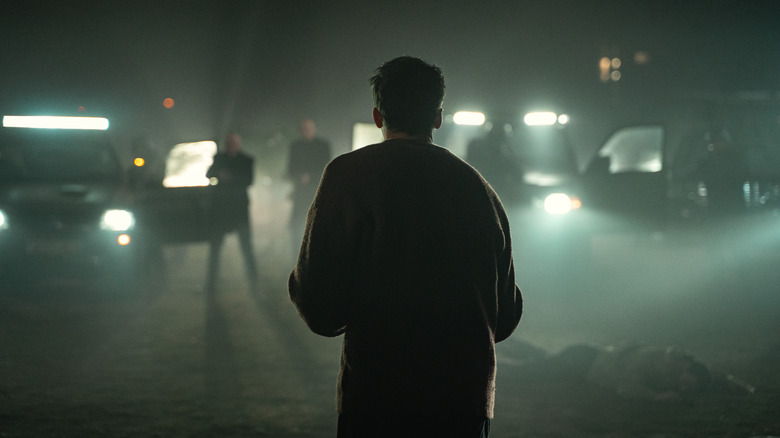The Futuristic German Thriller Taking Netflix By Storm
You just never know what might end up rising up the ranks of Netflix's top 10 charts these days. On any given week, viewers might suddenly show an increased interest in a horror film that promises to completely ruin your sleep schedule for the foreseeable future. On another, well, a procedural television show like "Suits" might randomly experience a surge of interest — despite a weirdly delayed reaction, with the surge taking place over four years after it concluded its run on the USA Network. The streaming algorithm is a mythical and unknowable enigma, apparently, but every now and then it can help put the spotlight squarely on the kinds of films that most benefit from strong word-of-mouth reactions.
One such movie is known as "Paradise." As of the publishing date of this article, the German-language thriller has rocketed up to the #2 spot internationally, according to stats collected by FlixPatrol, after becoming the #1 most-viewed non-English film last week (via Netflix's own publicly available, if somewhat vague, metrics).
Directed and co-written by German filmmaker Boris Kunz (along with co-writers Simon Amberger and Peter Kocyla), the film stars Kostja Ullmann as Max and Marlene Tanzcik as Elena, a couple living in a near-future society where the currency of choice is time. Headed by pharmaceutical corporation AEON and its CEO Sophie Theissen (Iris Berben), this paradigm-shifting breakthrough has paved the way for a world where people can trade years of their lives to others based on DNA compatibility. Naturally, this delicate balance soon ends up exploiting humanity's most vulnerable demographics to the benefit of the richest and most powerful. When Max and Elena's home burns down, forcing Elena to give up 38 years of her life to pay off their debts, Max must reckon with AEON's truly harmful actions.
Paradise is topping the Netflix charts -- and why that's a good thing
While "Paradise" hasn't necessarily blown critics away, it's clear that viewers are responding to something specific about the timeliness and relevancy of the plot. Borrowing heavily from the likes of past sci-fi movies like "In Time," "Elysium," and many more, all of which primarily focus on questions of societal inequality and exploitation taken to an extreme, "Paradise" certainly packs a social-commentary punch. This rings particularly true at a time when writers and actors are currently fighting for their own rights against the might of streamers and studios that have thus far refused to budge an inch in spreading the wealth to those who truly earned it.
This further adds evidence to the narrative that streaming services ought to be embracing. While traditional studios have made it increasingly difficult to fund and distribute smaller-budgeted, adult-oriented stories originating from outside the United States, Netflix has found itself becoming a safe haven for such stories to actually see the light of day ... as long as the streamer actually commits to marketing such movies and shows, that is. After "Squid Game" broke out largely thanks to its availability on Netflix, one would think streaming services would be falling over themselves to keep this momentum going.
Audience interest in "Paradise," a time-bending and twisty thriller most notable for coming from outside the Hollywood system, suggests that foreign-language films of a certain budget are still worth making. The Barbenheimer phenomenon reinforces the 21st Century conventional wisdom that blockbusters remain king. But if a movie like "Paradise" can find success against all odds, then perhaps its biggest lesson is that time hasn't run out, after all.

